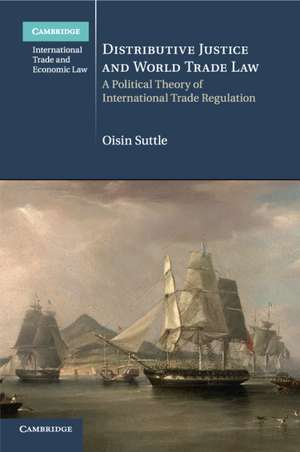Distributive Justice and World Trade Law: A Political Theory of International Trade Regulation: Cambridge International Trade and Economic Law, cartea 36
Autor Oisin Suttleen Limba Engleză Paperback – 5 dec 2018
Din seria Cambridge International Trade and Economic Law
-
 Preț: 177.62 lei
Preț: 177.62 lei -
 Preț: 271.22 lei
Preț: 271.22 lei -
 Preț: 284.39 lei
Preț: 284.39 lei - 23%
 Preț: 692.51 lei
Preț: 692.51 lei -
 Preț: 177.47 lei
Preț: 177.47 lei - 14%
 Preț: 699.45 lei
Preț: 699.45 lei -
 Preț: 216.93 lei
Preț: 216.93 lei - 14%
 Preț: 698.61 lei
Preț: 698.61 lei -
 Preț: 321.52 lei
Preț: 321.52 lei -
 Preț: 272.97 lei
Preț: 272.97 lei -
 Preț: 323.05 lei
Preț: 323.05 lei - 14%
 Preț: 868.71 lei
Preț: 868.71 lei -
 Preț: 292.88 lei
Preț: 292.88 lei -
 Preț: 288.42 lei
Preț: 288.42 lei - 23%
 Preț: 641.51 lei
Preț: 641.51 lei -
 Preț: 178.30 lei
Preț: 178.30 lei -
 Preț: 432.05 lei
Preț: 432.05 lei -
 Preț: 320.17 lei
Preț: 320.17 lei - 23%
 Preț: 753.36 lei
Preț: 753.36 lei - 11%
 Preț: 636.34 lei
Preț: 636.34 lei - 23%
 Preț: 616.00 lei
Preț: 616.00 lei - 14%
 Preț: 703.74 lei
Preț: 703.74 lei -
 Preț: 285.37 lei
Preț: 285.37 lei - 14%
 Preț: 699.45 lei
Preț: 699.45 lei - 14%
 Preț: 786.62 lei
Preț: 786.62 lei -
 Preț: 314.83 lei
Preț: 314.83 lei - 14%
 Preț: 895.68 lei
Preț: 895.68 lei - 14%
 Preț: 708.14 lei
Preț: 708.14 lei - 14%
 Preț: 1015.31 lei
Preț: 1015.31 lei - 14%
 Preț: 896.85 lei
Preț: 896.85 lei -
 Preț: 405.20 lei
Preț: 405.20 lei -
 Preț: 322.51 lei
Preț: 322.51 lei - 14%
 Preț: 727.26 lei
Preț: 727.26 lei -
 Preț: 283.79 lei
Preț: 283.79 lei - 14%
 Preț: 727.59 lei
Preț: 727.59 lei - 14%
 Preț: 785.48 lei
Preț: 785.48 lei
Preț: 323.81 lei
Nou
Puncte Express: 486
Preț estimativ în valută:
61.96€ • 66.26$ • 51.66£
61.96€ • 66.26$ • 51.66£
Carte tipărită la comandă
Livrare economică 17 aprilie-01 mai
Preluare comenzi: 021 569.72.76
Specificații
ISBN-13: 9781108402408
ISBN-10: 1108402402
Pagini: 422
Dimensiuni: 152 x 228 x 22 mm
Greutate: 0.56 kg
Editura: Cambridge University Press
Colecția Cambridge University Press
Seria Cambridge International Trade and Economic Law
Locul publicării:Cambridge, United Kingdom
ISBN-10: 1108402402
Pagini: 422
Dimensiuni: 152 x 228 x 22 mm
Greutate: 0.56 kg
Editura: Cambridge University Press
Colecția Cambridge University Press
Seria Cambridge International Trade and Economic Law
Locul publicării:Cambridge, United Kingdom
Cuprins
Part I. Foundations: 1. Introduction; 2. Why World Trade Law needs a theory of justice; Part II. Justice: 3. Towards a political theory of international economic law; 4. Sovereignty, nationality and the limits of statism; 5. Self-determination and external trade measures; Part III. Law: 6. Border measures, discrimination, and ETMs; 7. Justifying ETMs: development provisions and general exceptions; 8. Trade remedies and fairness in international trade regulation; 9. Domestic regulation, self-determination and DEMs; Part IV. Progress: 10. Conclusion: where to from here?
Notă biografică
Descriere
This book proposes a novel theory of justice in international trade law, examining what justice means and demands in this domain.
